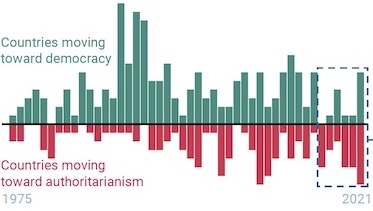The ups and downs of democracy
|
While
- in theory - most of us adhere to the opinion that 'democracy is the
worst form of government except for all others', we largely do this in
praise of the irony behind this statement, brought forward by Winston
Churchill in a speech to the House of Commons in 1947, referring to a
quote he missed to identify at this occasion. In 'The Open Society and
Its Enemies' (1945), Karl Popper gave a more sober definition of democracy as an
efficient tool for getting rid of bad rulers without bloodshed and
violence.
|
More than three quarters of a century later, an increasing number of populations
in the world stick to democracies, and this proportion is still on the
rise, inspite of several minor problems (see top figure). Thus, the
concept seems to work, although we still seem to miss a true
understanding of all its 'inner workings' - whatever this last term
should mean. The human race, as all species forming extremely large
societies, will always harbor some degree of unpredictablity, a natural
feature of complex dynamic systems.
|
If
we broaden the view on ourselves by scaling up from single individuals
to the more meaningful population
level, the social world appears as a colorful living tapestry covering
the planet, and we all contribute to one or even more of these
entities. Although our own contribution as an individual to further
developments seems to be negligibly small, 'democracy' should guarantee
that no single voice gets unheard. For each of us, this may feel like a
miracle*, but to contribute successfuly to society, we have to believe
in miracles.
|
At the
same time, we should not be too naive: we should insist on at least the
most basic principles of any democracy (e.g. one vote for each person -
not counting infants). This was a matter of debate even from the
beginnings in ancient Greece. It may be argued that wise decisions need
knowledge and reason, and that not all members of a society command
these qualifications to the same extent. But remember Karl Poppers
insight: It is not the strength of democracy to find wisdom, but to
avoid its misuse.
|
It is up to us to fill the concept with life. With some patience, democracies will ripen. No
single ruler should expect in his/her lifetime to see the fruits of
his/her skills and efforts. Most average lay persons have the
spontaneous instinct to sense the true ambitions of any applicant
asking for their votes. The result is not so much dependent on
expertise but on statistics: personal taste is cancelled out, but positive general impression will add up.
|
To vote is no intellectual act. It
is a service to society everybody is summoned to deliver. To be
relevant, votes need participation. Their results have to be respected
with humility, as the verdict of an authority surpassing our own by
far. Impeding the undisturbed delivery of votes or manipulating their
evaluation is a severe crime. The victim of this crime is the whole
population. Sometimes, we may not welcome the result of a
particular vote, but nevertheless we should accept it as
inescapable as bad weather.
|
Both, the weather and human populations, obey the more or less fuzzy laws of complex dynamic systems.
|
6/22 < MB 12/22 > 11/23
|
see also: How to deal with angry voters?
|
*After
reading, my wife asked me to be more specific on the term 'miracle'.
She is probably right with her warning, I might evoke the wrong
impression. Of course I remain on solid scientific ground (although,
complex dynamic systems & solidity...). Here,
the term 'miracle' is used for a process surmounting our own
capabilities as a single person and isn't meant as something out of the
natural.
|
Calhoun C, Gaonkar DP, Taylor C (2022) Degenerations of Democracy. Harvard University Press, Cambridge MA.
|

